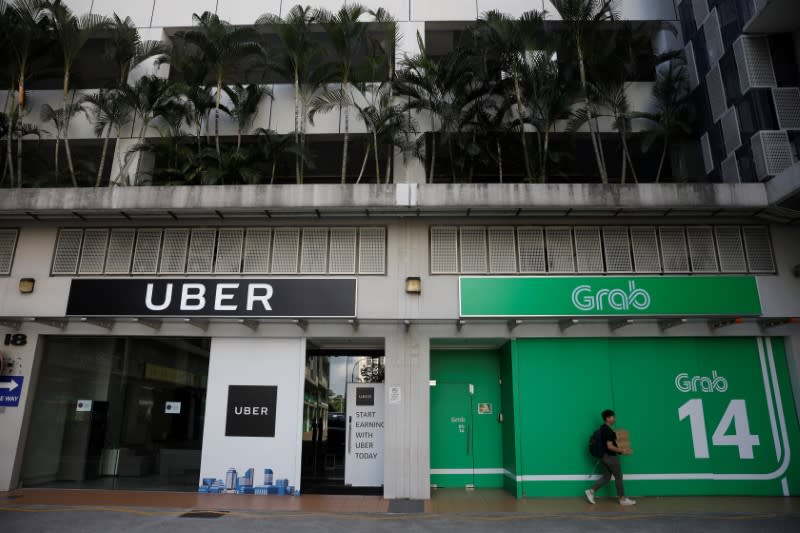Grab-Uber merger has led to ‘substantial lessening of competition’, fines proposed: CCCS

The Competition and Consumer Commission of Singapore (CCCS) has provisionally found that the merger between Grab and Uber has led to a “substantial lessening of competition” in the ride-hailing market and proposed to fine both companies.
“The merged entity is likely to be able to increase prices and has in fact done so since the completion of the transaction,” said CCCS in a press release on its Proposed Infringement Decision (PID) against the merger on Thursday (5 July).
Describing the two companies as “each other’s closest competitor”, CCCS said without sufficient competition after the merger, Grab would be able to raise fares for riders and commission rates for drivers, lower the quality of its services and reduce innovating its product offerings.
“Further, CCCS has received numerous complaints from both riders and drivers in relation to the increase in effective price post-transaction (e.g. via a decrease in quantum and frequency of driver promotions and driver incentives), reflecting Grab’s ability to increase effective prices post-transaction,” CCCS said.
The commission said that it found evidence during its investigation that Uber would not have left the market in Singapore if there were no merger, noting that Uber would have either continued its operations or merged its Southeast Asian business with other potential buyers who were not its current competitors in Singapore.
For example, CCCS cited Uber’s proposed collaboration with ComfortDelGro with the introduction of UberFlash to compete with Grab. The collaboration with ComfortDelGro was withdrawn after Grab and Uber announced their merger.
Hence, the merger has removed competition between two prevailing competitors in the ride-hailing market in Singapore, said CCCS.
On taxi booking services, CCCS found that the market segment does not pose a competitive impediment to Grab and Uber, with less than 15 per cent market share, it added.
The barriers to entry and expansion in the ride-hailing business are “high due to strong network effects”, given Grab’s imposition of exclusivity obligations on taxi companies, car rental partners and some of its drivers. As such, any new entrants would likely have to incur “significant amount of upfront capital” in order to attract drivers and riders.
“Without any intervention from the CCCS, it could continue to hamper the ability of potential competitors to access drivers and vehicles,” CCCS said.
In addition, CCCS said the chauffeured private hire cars (CPHC) rental companies may not be able to compete effectively without a tie-up with a ride-hailing platform. Grab would be in a strong position after the merger to form exclusive arrangements with the CPHC rental companies and their drivers, thus reinforcing its position in the ride-hailing market.
Grab and Uber have not been able to show that the merger “gives rise to efficiencies that would outweigh the harm to the competition”, said the CCCS.
Consequently, CCCS has issued a set of proposed remedies in relation to the merger.
It proposed that Grab remove its exclusivity obligations, lock-in periods and/or termination fees on all drivers who drive on Grab’s platform and/or who rent from rental partners of Grab and removal of Grab’s exclusive arrangements with any taxi/CPHC fleet to increase choices and improve market contestability.
CCCS also recommended the maintenance of Grab’s pricing algorithm and driver commission rates prior to the merger until the competition is revived.
It also suggested for Uber to sell Lion City Rentals – all or any part of the assets – to any potential competitor, which would prevent it from selling it to Grab without approval by CCCS.
CCCS is inviting members of the public to give their submissions on its proposed remedies by 19 July.
Depending on the outcome of the public consultation, CCCS may require both companies to unwind the merger.
Both Grab and Uber have 15 working days from the receipt of the PID to make their representations to the CCCS, following which the commission will make its final decision.
CCCS pointed out that it sent a letter to both companies on 9 March to explain Singapore’s procedures for mergers and its role as a competition watchdog. The companies had the options to clear or consult with CCCS on the merger but they proceeded with the deal without doing either, it added.
The ride-hailing giants announced the merger on 26 March, which saw Uber taking a 27.5 per cent stake in Grab along with a seat on the latter’s board. The following day, the CCCS began its investigations into the merger.
In response to the statement by CCCS, the Land Transport Authority (LTA) said, “This is in line with LTA’s review of the broader regulatory framework for the P2P (point-to-point transport) sector, which aims to ensure that the sector remains open and contestable and that no single operator dominates the market to the detriment of commuters and drivers.”
If the fines were to be carried out, it would mark the first time that such a penalty was imposed by CCCS on any company for a merger deal. When asked by Yahoo News Singapore on the quantum, a CCCS spokesperson said that the commission will finalise the proposed amount of fines after considering representations from Grab and Uber.
Yahoo News Singapore has reached out to both companies for comments.
Related stories:
Uber to continue operations in Singapore till May 7: competition watchdog
Over 500 Uber staff in Singapore placed on paid leave following Grab-Uber merger



